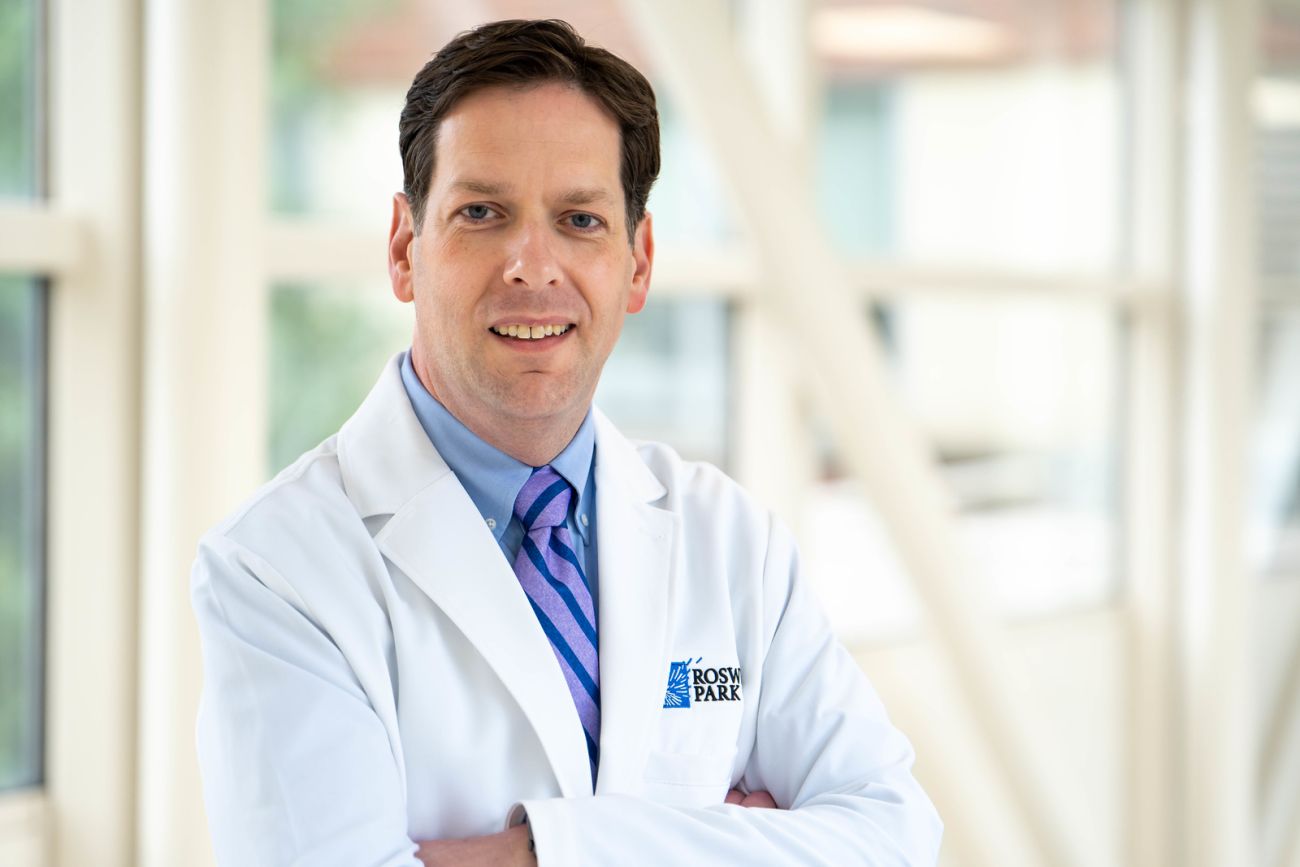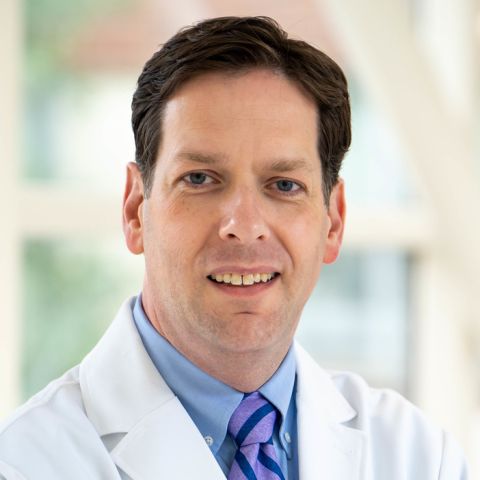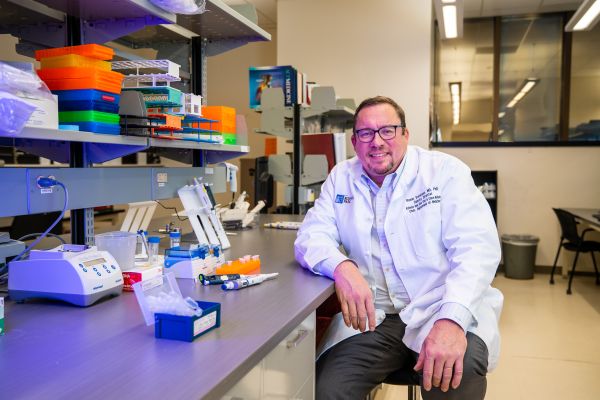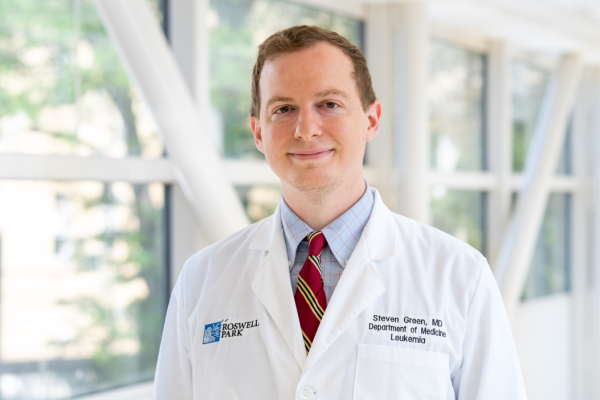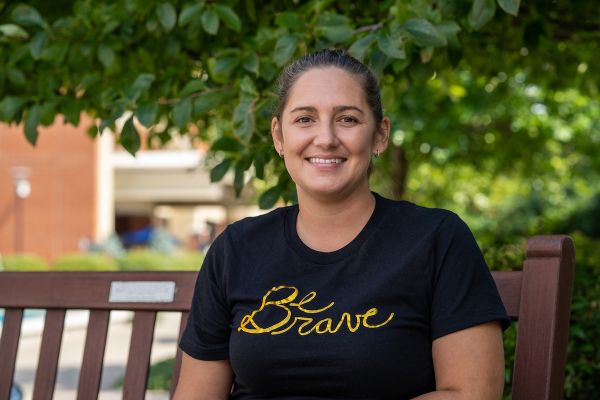Brian Betts, MD, grew up in and out of the hospital, dreamed of — and pursued — a side quest of being a punk rock drummer, then a morning show DJ, and now works to develop revolutionary new treatments to help patients avoid the most common setbacks that can occur with a stem cell transplant.
As a child, Dr. Betts, Vice Chair of Strategic Initiatives for Transplant and Cellular Therapy in the Department of Medicine at Roswell Park Comprehensive Cancer Center, spent a lot of time in hospitals, having several procedures before the age of 7 to fix a condition he had from birth. “I kind of got used to that environment. I enjoyed the interactions with residents and, even as a kid, got a kick out of the banter and academic debate of morning rounds,” he says.
There was a clarity and an order to everything, with the doctors and nurses working together in an organized way that allowed him to feel safe, cared for and that the people in charge knew just what to do to help him.
At the same time, his father was going to medical school, meaning Dr. Betts was surrounded by medical and science terminology throughout most of his childhood and into his teenage years.
Despite that, he had another career in mind as he grew up, even before he attended Eastern Virginia Medical School and began studying science and medicine: He wanted to be a DJ, if not a drummer in a punk band. “I worked my way up to be the music director at the station, which oddly enough is a lot like being a chief resident — something I’d do later in my medical training. But maybe it was the emergence of satellite radio and streaming services, or my dad not so subtly suggesting I consider other career paths, but I then set my sights on medicine,” he says.
Out of the booth and into the operating room
Music receded to the background for a few years as medicine took center stage.
“Initially when I went into medical school, I was pretty interested in being a surgeon because of my history as a kid. Then as I went through courses in immunology and pathology, I got more excited about the immune system,” Dr. Betts says. “I remember having talks with my dad during dinner about the original discovery of T and B cells in the 1960s and later learning more about how you can actually use the immune system to go after cancer, which was pretty exciting.”
During his medical training, Dr. Betts met and worked with pioneers in the field of chimeric antigen receptor T-cell therapy, better known today as CAR T-cell therapy, as a way to weaponize someone’s own body and immune cells to help fight difficult kinds of cancer including lymphoma and leukemia. He worked with two researchers now part of the leadership at Roswell Park: Renier Brentjens, MD, PhD, and Marco Davila, MD, PhD, both internationally known for their work in CAR T-cell therapy.
“When I was a fellow at Memorial Sloan Kettering, we were seeing engineered white blood cells being used to fight cancer for the first time,” Dr. Betts says. “Seeing real time application of the immune system fighting cancer got me interested in stem cell transplantation. For the past 30 years, a lot of oncology had been based on chemotherapy, cytotoxic agents that don’t have the ability to differentiate healthy tissue from cancerous tissue. There are a lot of side effects that way. With CAR T-cells, they are much more precise in what they’re going after,” which helps reduce side effects for patients as they go through treatment, he explains.
Why Roswell Park for transplant therapy?
Dr. Betts is one of many in our team of world-renowned physicians and scientists who were central to historic breakthroughs in cellular therapy.
Working to improve patient care through groundbreaking medicine
Dr. Betts splits his time between the lab and working directly with patients, combining his passion for science with a drive to offer hope — and maybe a little well needed humor too — to people spending a lot of time in hospital rooms like he did as a child. His work in the lab focuses on improving how stem cell transplants and other cellular therapies work against cancer and combating possible complications, such as graft versus host disease and cancer relapse.
“The science part is fun because eventually it’s going to help people out,” he says. “I think it’s neat watching something in the lab and there are moments when you’re pipetting stuff, or you’re planning out an experiment and thinking ‘Wow, this might actually go somewhere pretty big.’ I remember having that same thought when we were working with those CAR T-cells. As we approach new upcoming clinical trials, it brings it all back together. All the time in the lab, working out experiments, writing grants, it’s a whole process and a lot of work that all comes down to actually helping people, which is pretty exciting.”
Dr. Betts, working with Dr. Brentjens and Dr. Davila, is part of the team focused on making Roswell Park a destination for cellular therapy — for patients and researchers alike.
But he has a small ulterior motive that brings back to the forefront his early dreams of music stardom.
Breaking down beats and treatment barriers
Still an active drummer, Dr. Betts is hoping not only to get the band of researchers from his fellowship days back together, but also the band he formed in Minnesota with other physician-scientists, including another new face around Roswell Park, Shernan Holtan, MD, the new Chief of the Transplant and Cellular Therapy Center.
“There was a Women in Medicine and Science Day where a bunch of us got together and played some songs. Dr. Holtan plays bass, I still drum and we played a cover of ‘She’ by Green Day. It was a lot of fun,” he says.
The bridge between music and medicine is an easy one for him to walk. “Medicine is a little more linear, it’s more factual, but you need some creativity. Music helps you think about things in different ways. Punk is all about taking something that’s established and turning it inside out and saying we don’t need to limit ourselves to that.
“That’s a good example of using T cells to fight cancer. My research looks into using T cells to fight graft versus host disease, which is caused by T cells, but they can also be used to fight leukemia. We know transplants can result in graft versus host disease but if we can use a virus in a vaccine to help fight off illness, why not try to use T cells to fight off this too,” he says.
